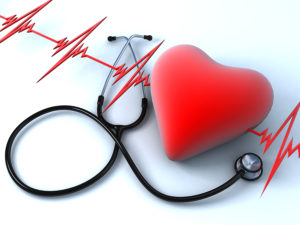 February is American Heart Month. Heart disease is the number one killer of both men and women in the United States. Over 600,000 people die of heart disease in the United States every year – that’s 1 in every 4 deaths. “Heart disease” refers to several different types of heart conditions. The most common type of heart disease in the U.S., coronary artery disease (CAD), kills over 370,000 people annually. CAD is caused by plaque buildup in the walls of the arteries, affecting the supply of blood to the heart. Over time, CAD can weaken the heart muscle and lead to heart failure.
February is American Heart Month. Heart disease is the number one killer of both men and women in the United States. Over 600,000 people die of heart disease in the United States every year – that’s 1 in every 4 deaths. “Heart disease” refers to several different types of heart conditions. The most common type of heart disease in the U.S., coronary artery disease (CAD), kills over 370,000 people annually. CAD is caused by plaque buildup in the walls of the arteries, affecting the supply of blood to the heart. Over time, CAD can weaken the heart muscle and lead to heart failure.
Some health conditions, lifestyle choices, age and family history can increase your risk for heart disease. About half of all Americans have at least one of the three key risk factors for heart disease, including high blood pressure, high cholesterol, and smoking.
While you can’t control some risk factors, such as age and family history, there are steps you can take to lower your risk of heart disease.
Conditions that increase risk for heart disease:
- High Blood Pressure: High blood pressure (hypertension) is a major risk factor for heart disease. High blood pressure is often called a “silent killer” because many people don’t have symptoms.
- High Cholesterol: Cholesterol is a waxy, fat-like substance made by the liver or found in certain foods. Some cholesterol is “good” and some is “bad”. High cholesterol is the term used for high levels of low-density lipoprotein (or LDL) which are considered bad because they can lead to heart disease. A higher level of high-density lipoprotein cholesterol (or HDL) is considered good because it provides some protection against heart disease. A blood test can detect the amount of cholesterol and triglycerides (a related kind of fat) in your blood.
- Diabetes: Diabetes also increases the risk for heart disease. Diabetes causes sugars to build up in the blood. The risk of death from heart disease for adults with diabetes is two to four times higher than adults who do not have the disease.
Behaviors that increase risk for heart disease:
- Unhealthy diet and salt intake: Diets high in saturated fats, trans fat, and cholesterol have been
 linked to heart disease. Also, too much salt (sodium) can raise blood pressure levels.
linked to heart disease. Also, too much salt (sodium) can raise blood pressure levels. - Physical inactivity: Not getting enough physical activity can lead to heart disease and increase chances of of other medical conditions that are risk factors, such as obesity, high blood pressure, high cholesterol, and diabetes.
- Obesity: Obesity is linked to higher “bad” cholesterol and triglyceride levels and to lower “good” cholesterol levels. Obesity can also lead to high blood pressure and diabetes.
- Alcohol consumption: Drinking too much alcohol can raise blood pressure levels and the risk for heart disease.
- Tobacco use: Cigarette smoking can damage the heart and blood vessels, which increases your risk for some heart conditions and heart attack. Also, nicotine raises blood pressure, and carbon monoxide reduces the amount of oxygen that your blood can carry. Exposure to second-hand smoke can increase the risk for heart disease even for non-smokers.
Preventing Heart Disease:
- Have your cholesterol and blood pressure checked regularly. Your health care provider can determine how often you should be checked based on your risk factors. If you have high cholesterol, medications and lifestyle changes can help reduce your risk for heart disease. If you have been diagnosed with high blood pressure, your health care team may recommend strategies to help monitor and improve your blood pressure control. If they prescribe medications, make sure to follow their instructions carefully.
- Manage diabetes. If your health care provider thinks you have symptoms of diabetes, they may recommend you get tested for it. If you have diabetes, talk with your
 health care team about treatment options. They may recommend certain lifestyle changes to help keep your blood sugar under control and reduce your chances for heart disease.
health care team about treatment options. They may recommend certain lifestyle changes to help keep your blood sugar under control and reduce your chances for heart disease. - Eat a healthy diet. Choose healthful food options that can help you avoid heart disease. Eat plenty of fresh fruits and vegetables and fewer processed foods, and watch how much salt you consume.
- Maintain a healthy weight. Being overweight or obese increases your chances for heart disease.
- Be physically active. Physical activity can help you maintain a healthy weight and lower your blood pressure, cholesterol, and sugar levels. The Surgeon General recommends at least two-and-a-half hours of moderate-intensity exercise, such as brisk walking or bicycling, every week for adults. Children and adolescents should get at least one-hour of physical activity every day.
- Don’t smoke. Cigarette smoking greatly increases your risk for heart disease. If you don’t smoke, don’t start. If you do smoke, you can get help to quit here.
- Limit alcohol. Avoid drinking too much alcohol. Men should have no more than two drinks per day and women only one.
For more information about heart health and what you can do to reduce your risk of heart disease, visit the Centers for Disease Control and Prevention website.
